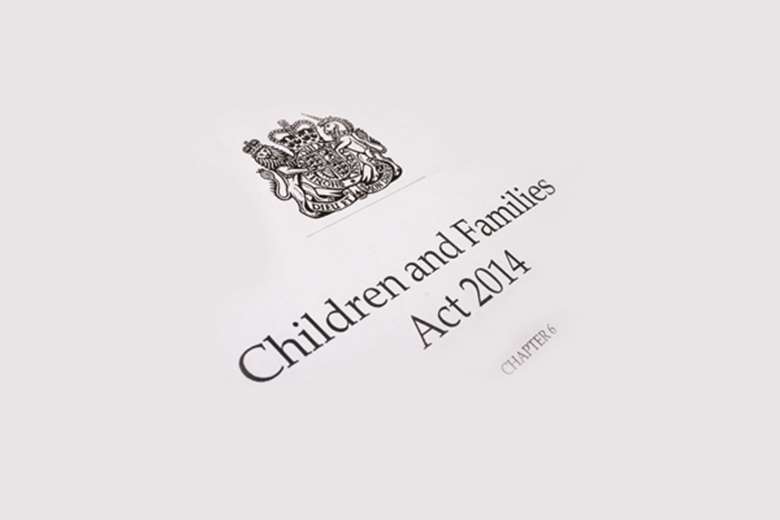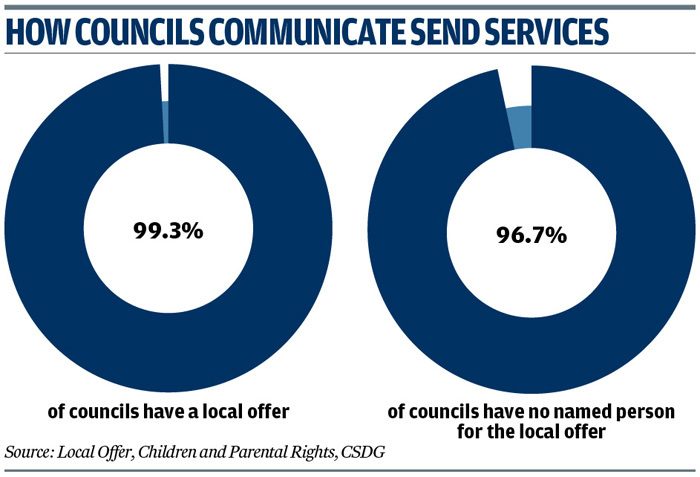Communicating the SEND offer
Jess Brown
Tuesday, September 13, 2016
Research shows most local offers for SEND services are poor, prompting calls for a standardised approach.

Two years on from the introduction of measures to improve support for children with special educational needs and disabilities (SEND), questions have arisen over how well a key part of the reforms have been implemented.
The SEND Code of Practice requires local authorities to publish online a local offer of support - an up-to-date list of education, health and social care services - that acts as a directory for families of children with SEND (see below).
But a report by the National Autistic Society published this month said the majority of parents are finding the local offer difficult to use. Its research found 55 per cent of parents surveyed said it was "quite difficult" or "very difficult" to find information about support for their child, with 44 per cent saying it was "very easy" or "quite easy".
Significantly, 72 per cent of parents said they had not been able to access services for their child through the local offer.
Audit of local offers
These findings were followed by the results of an audit of all local offers in England by the Children's Services Development Group (CSDG), detailed in its Local Offer, Children and Parental Rights report.
It found that the layout, detail, accessibility and level of choice of local offers varied across the country, and some local authorities were not meeting legal obligations.
Cheryl Gillian, MP and chair of the all-party parliamentary group on autism, describes the report findings as concerning.
"The layout, detail, accessibility and level of choice presented by authorities varies significantly," she says. "This means that access to specialist provision remains highly dependent on where you live, and remains a lottery."
Despite finding that 99.3 per cent of councils have a local offer, the report states there is a high proportion of "rudimentary offers" and that the vast majority are not very clear. It states that, in many cases, the poor quality of information about services has "severely limited" families, choices.
The CSDG calls on the government to look at how to encourage the sharing of best practice guidance for local authorities across regions, and the introduction of a standard template for the local offer to improve the variation in quality.
Local area SEND inspections, introduced this year by Ofsted and the Quality Care Commission, have also shown patchy progress with implementing the local offer. Six areas have been inspected so far.
The inspection in Hertfordshire found that the local offer is "underdeveloped, unclear and the source of much frustration among parents". Many parents do not know about the local offer, the inspection report states, or feel it does not meet their needs.
In Brighton, inspectors concluded: "Local area leaders have rightly identified that the local offer is not easy enough to use. Many parents are not aware of what the local offer is and very few use it to help them."
Inspectors said some families in Gloucester and Nottinghamshire did not find the offer easy to navigate or were not aware of its purpose.
Only 3.3 per cent of councils have a named person who parents can go to for help about the offer, the CSDG audit revealed. It says this could discourage families seeking further information on services available to them, and recommends that the government should require all councils to have a named contact.
Not fit for purpose
The report also states that councils rely too heavily on the DfE's online directory of approved independent schools, called Section 41. The report calls the list "rudimentary" and "not fit for purpose" as a resource for parents because it does not group schools together geographically. CSDG recommends that the DfE's directory is significantly revised.
Fewer than one in 10 local authorities provide or link to any information about independent schools and colleges, while 57 per cent do not provide any information of the specialisms of independent schools on their local offer page, the CSDG found.
The organisation concludes that difficulties councils have had with implementing and maintaining the local offer can partly be attributed to the changes in support for children with SEND - by 2018, councils must transfer all children with a statement of SEN to an education, health and care plan.
The Council for Disabled Children (CDC) agrees there needs to be a more consistent approach to how councils provide local offers.
"We are aware of some of the omissions from local offers," says Philippa Stobbs, assistant director of CDC. "Our findings found huge variation in the quality of information provided and accessibility for children, young people and their families. We found local authorities needed to be much clearer in meeting the requirement to set out what special educational needs provision and special training it expects schools to make available."

Statutory duties under the 2014 SEND reforms
Under the SEND Code of Practice, introduced as part of the Children and Families Act 2014 reforms, local authorities have a statutory duty to develop and publish a local offer.
Local authorities must publish all of the provision "they expect to be available across education, health and social care for children in their area", including those not with an education, health and care plan.
The local offer has two key purposes: to provide clear, up-to-date information about services and how to access them; and to make local provision more responsive to local needs by involving young people and their parents in its development.
Source: SEND Code of Practice, DfE




